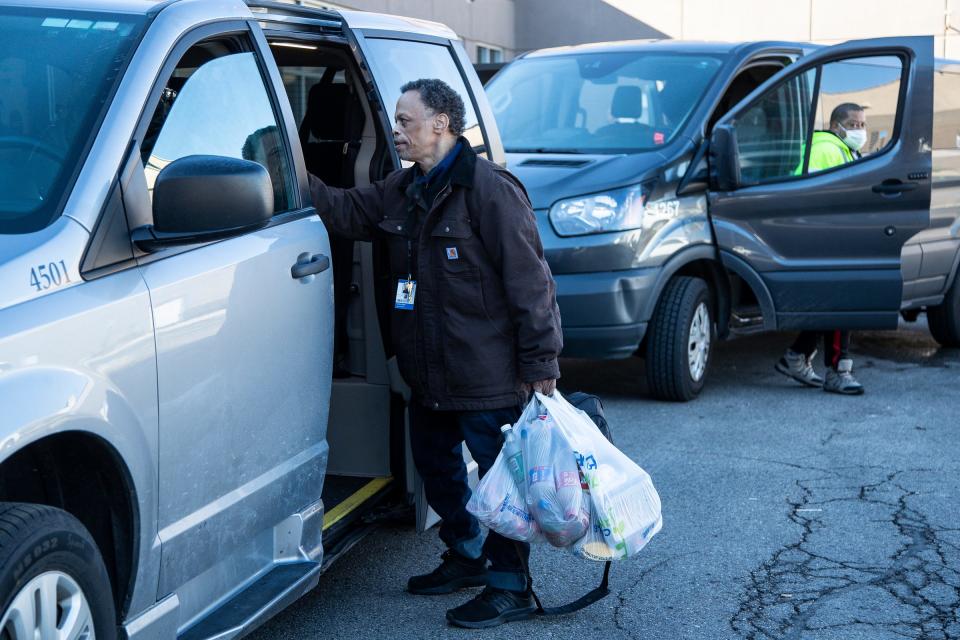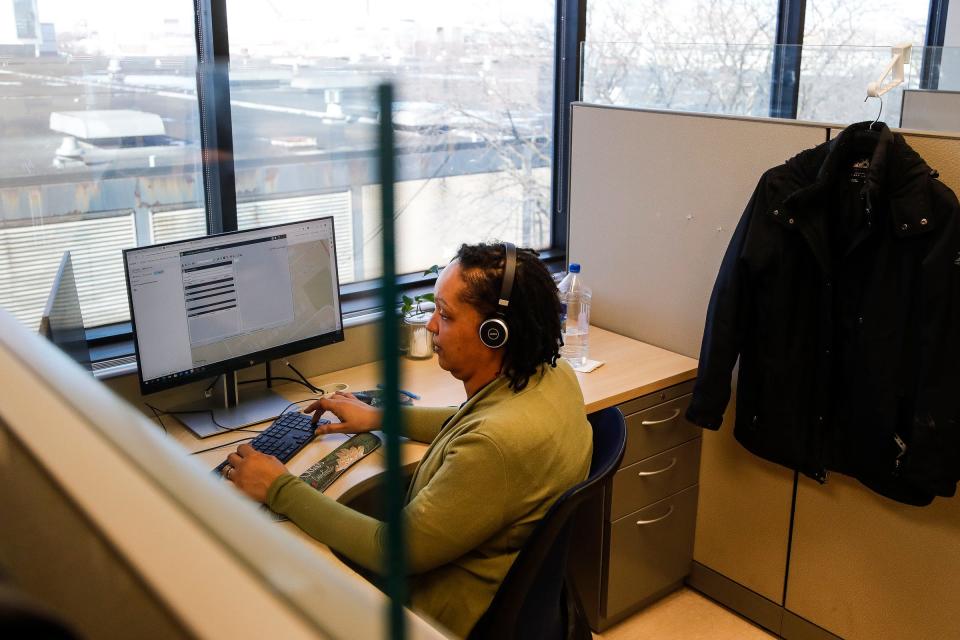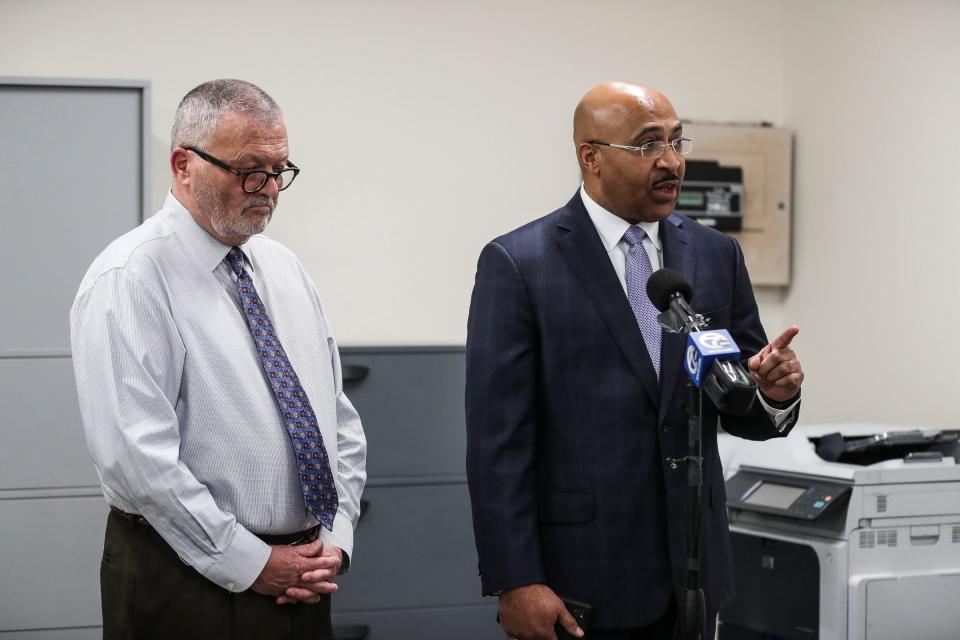Detroit paratransit improves but riders expect stability under city oversight
Detroiters relying on paratransit services have faced mixed experiences through a longtime-contracted transportation company that City Council nixed late last year due to rising complaints.
As a result of voting down a contract with French-based company Transdev, the mayor flexed his executive power to implement a six-month emergency contract with Moe Transportation, Big Star Transit LLC, Delray United Action and Checker Cab Co., which Detroit Transit Director Mikel Oglesby said is performing "a lot better than a lot of people expect" at a Tuesday news conference where he gave an update on the city's paratransit status.
Some riders agreed with the city assessment but added that they expect the city to provide adequate services through the next contract.
Cedric Hood, a 56-year-old who has relied on paratransit five days a week for many years, had mixed experiences. Drivers have either showed up early or late, he said. But Hood also noted that they have helped him stay physically balanced when needed and remain secure in the vehicle.
One of Hood's main concerns is ensuring a safe trip.

"Some of the drivers drive at the right pace and some drive too fast. And some of them take their time coming. Some come when they want to. It’s still kind of a work in progress," Hood said. "Sometimes, I have to let a driver know I'm upset because I don’t like how they're driving but other than that, things are good."
More:Detroit Mayor Mike Duggan puts emergency contract in place to fund paratransit services
More:Detroit City Council votes down nearly $50 million paratransit contract
City Council in November 2022 approved then reversed its decision on a nearly $50 million contract with Transdev to cover 70% of services after riders complained each week about poor service. The contract would have put the oversight in the city's hands, but community and council members had limited faith in the system. People's Express Inc. runs the other 30% of services.
The emergency contract, which Mayor Mike Duggan issued to prevent federal enforcement, called for securing four transit providers for six months that began Jan. 1. The city has an obligation to provide paratransit services under the federal Americans with Disabilities Act. Failing to do so could expose the city to U.S. Department of Justice investigations and a loss of federal funding, according to a 2022 letter from the Federal Transit Administration.

Oglesby said the city issued a new request for contract proposals. He said that during an informational pre-bidding process, which ran in mid-February, 40 people from 20 companies were interested in the bid to run the remainder of Detroit's paratransit services.
Paratransit manager Michael Staley touted improved on-time performance rate reaching about 90% since the interim contract went into effect. Transdev reported an 85% on-time performance rate last year. Service under a new contract is expected to go into effect by July 1, Staley added.
"Not only will we be able to continue with the momentum that we've established to date, but we'll also be able to take complementary paratransit, the ADA service, to the next level, which is what's expected by our customers and quite honestly what they deserve," Staley said.
Customer service duties, including handling complaints and scheduling, is being done by the city and is going according to plan, Oglesby said. Transdev was responsible for the services under the previous contract.
"We're very proud that people are excited. More importantly, things do happen. Issues do happen. And that's where customer service comes in, to make sure that people feel respected," Oglesby said. "People feel that we understand and we do understand that is our main focus, to show that we care and that is our basic structure moving forward."

Thomas McCool, a 29-year-old who has relied on paratransit for about five years, uses it three days a week to get to work. McCool typically has to call and book a ride a day in advance but has not faced major issues.
"They come and get me on time," McCool said. "Sometimes, I've had to call again and see where they’re at. ... Sometimes they’re late."
Stephen Handschu, 76, a member of the Detroit chapter of the National Federation of the Blind, had different experiences. Handschu identifies as a blind person dealing with hearing loss and has relied on paratransit since 2016. He repeatedly complained to city officials about issues he and other members faced as riders, such as unprofessional drivers and late pickup times causing him to be late to work, on top of having five minutes to show up to the vehicle. But under the emergency contract, services are better, he said.
"I don’t want people to feel that we’re complainers, that we don’t see anything but the negative," Handschu said. "One thing that’s gotten better is the telephone answering times have significantly improved. I would routinely wait between 15 to 30 minutes on hold before getting a call answered prior to Jan. 1. I've had episodes of that happening in the first couple of weeks in January but since that, I have not had outrageous wait times. If you said to any paratransit user that they were going to be able to have their telephone call answered within a minute or two, everybody would’ve laughed."
Although services have improved under city oversight, "they are not out of the woods," Handschu said, adding that he wants the city to implement driver training.
"The more the city is directly responsible for the service, the happier we are because it's in one place. Director Oglesby makes very clear that he's in charge of this system. He has been incredibly professional and has gotten pretty good marks. He came on in the middle of what could’ve been a disastrous situation," Handschu said.
Dana Afana is the Detroit city hall reporter for the Free Press. Contact: dafana@freepress.com or 313-635-3491. Follow her on Twitter: @DanaAfana.
This article originally appeared on Detroit Free Press: Detroit paratransit users see change under temporary city oversight

